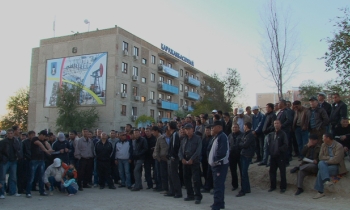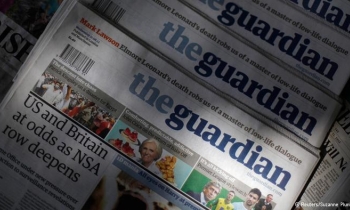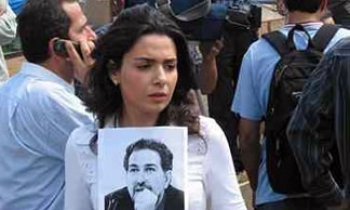Aboard the crowded D train, rumbling into Brooklyn on the Manhattan Bridge, the inevitable rant explodes. A rant courtesy of Faye Anderson, whom we'll call Ms CJ, a k a Citizen Journalist. A rant directed at us, Mr MSM, a k a Mainstream Media, for all our perceived faults.
"It's not you, the journalist, it's the institution," Ms CJ tells Mr MSM. "You're not telling the whole story. ... You've lost your credibility. ..."
We listen, take notes, check if the tape recorder's working. No telling what Anderson might do if she's misquoted.
She's saying anyone can be a journalist, at least anyone with an internet connection. Start a blog, she says, that's easy. (Hers is called Anderson at Large, nearly three years old and one of the more prominent blogs in the growing Afrosphere, the African American online political sphere, where Field Negro, Jack and Jill Politics and African American Political Pundit also are must-go-to sites.) Learn how to record a podcast, no sweat. (A few weeks ago she attended a podcasting camp in Boston.)
We want to say, hey, it's not that simple, this journalism thing, but we hold our tongue and keep listening. Fact is, independent of the candidates, voters - you - are interacting with the 2008 presidential election at an unprecedented level because of the internet, YouTubing, Facebooking, Wikipedia-ing, et al. So why not call yourself a journalist and cover the campaign, too? Whether or not we MSMers like it, the loose, undefined, evolving cadre of CJs are here to stay.
They're blogging up a storm over at Huffington Post, on the liberal site's CJ-centric Off the Bus section. High school and college students are writing for Scoop08, where relatively experienced student journalists are guiding inexperienced student CJs. MTV has launched its own CJ-oriented project: A team of "mobile youth journalists" will be assigned to cover each state from their own point of view.
Citizen journalism is giving voice to those who, in the pre-internet era, may have felt voiceless. But some challenge the value of all this citizen involvement. Is it really "journalism"? Are "they" really "journalists"? What's the difference between citizen journalists and bloggers who write about politics?
Orwellian ring
"The term 'citizen journalist' has an Orwellian ring to it," says Andrew Keen, author of The Cult of the Amateur, who's criticised the Web 2.0-Wikipedia world, where everyone can become their own editors.
"People are becoming Big Brother, either with a camcorder or a keyboard, and following the candidates around. It's ridiculous. You can't just be a great journalist, the same way you can't be a great chef or a great soccer player."
Journalists, he continues, "follow a set of standards, a code of ethics. Objectivity rules. That's not the case with citizen journalists. Anything goes in that world."
And sometimes the facts go out of the window.
Others argue that journalism is enriched through everyday Joes and Janes, who offer more voices, more texture to public debate.
Mitchell Stephens, who teaches media history at New York University, says citizen journalism harks back to the days of spoken news, when communities gathered in open-air markets and town squares. It can be traced to Thomas Paine and the pamphleteers of the 18th century, and to the antiwar, counterculture alternative press that prospered in the 1960s.
A citizen journalist, Stephens notes, is not the same as a political blogger. The former can, and sometimes does, original reporting; the latter, for the most part, is a political junkie armed with opinions. But these definitions don't always fit.
"There really is no simple definition for what a citizen journalist is, just lots and lots of examples," says Dan Gillmor, former technology columnist for the San Jose Mercury News and author of We the Media: Grassroots Journalism by the People, for the People.
"It ranges from people who do journalism all the time to people who do what you might call a random act of journalism to people who don't consider themselves journalists but are in fact practising journalism.
"The publishing tools - digital cameras, blogging software - are at the people's disposal," Gillmor continues. "And for a lot of them, the underlying motivation is frustration with the traditional media."
Take Anderson.
Now off the D train, Ms CJ continues with her rant as she steps onto the streets of Brooklyn. She's railing against illegal immigration - "What part of illegal," she snaps, "don't you get?" - and wonders where the MSMers are in covering this "big, big, big" story.
Tall and striking, Anderson was raised in Brooklyn's rough Bedford-Stuyvesant neighbourhood and first set foot on an airplane on her way to California to attend Stanford Law School. She looks like a cross between Meryl Streep, Chita Rivera and Pam Grier, with physical features as hard as to pin down as her politics. She grew up a Democrat, switched to the Republican Party in the Reagan years and bolted out of the GOP in 2000, following the election debacle. Now an independent, she supports none of the candidates.
Journalism, as political MSMers in Washington practice it, is too inside-the-Beltway, too beholden to sources, Ms. CJ says, all about the horse race, the money haul, the strategists, the pollsters, all about ensuring that official Washington and its political class stay employed.
"And not enough about the issues," Anderson points out, "never enough about the issues." She blogs about illegal immigration constantly and wrote extensively about the Jena Six case well before the MSM started covering the racial conflicts seething in that small Louisiana town. She credits black bloggers, alongside black radio, with closely following that story.
Citizen journalism, she continues, is her entry into the political process, a way for "an outsider like me to play some sort of role" - a curious statement since she herself is a former Washington player, a policy wonk who once served as the face of the Republican Party to African Americans, a regular on C-SPAN's "Washington Journal." But those days are over.
"Washington was physically making me sick," Anderson explains.
So she collected a list of clients for her policy consulting business and returned to Brooklyn. For almost three years, Anderson's been a full-time policy consultant and citizen journalist.
Anderson at Large is nowhere near as widely read or heavily linked as RedState or Daily Kos, the popular conservative and liberal blogs. Technorati, which tracks a site's number of links, says Anderson's blog has received 236 blog mentions, while RedState and Daily Kos have received 21,000 and 107,000, respectively.
But Anderson points to other successes. She's the first blogger to belong to the Trotter Group, a 15-year-old association of well-known black journalists. And last summer, she was credentialled to cover the Democratic debate at Howard University.
Says Anderson: "Look, everyone's trying to analyse what citizen journalism is, what its impact will be in this election. We, the citizen journalists, are figuring it out. You mainstream media folks are figuring it ut. But whatever it is, there's no going back. We're here. Get used to it."









